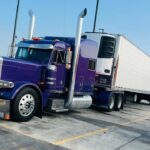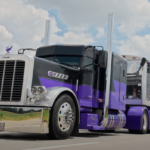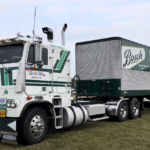During a Senate committee hearing on Wednesday, Chris Spear, the President and CEO of the American Trucking Associations, spoke about the need for the trucking industry to have achievable and practical national timelines and goals for reducing emissions. He emphasized that it was important for these targets to be set on a national level, rather than being dictated by individual states like California. According to Spear, such national standards would ensure that all trucking companies across the country are operating under the same regulations, without being burdened by a patchwork of varying state-level standards.
“The trucking industry starts with ‘yes,'” Spear testified before the Senate Environment and Public Works Committee today. “ATA worked with the Environmental Protection Agency, producing Phases I and II emission reduction rules, as well as the SmartWay Transport Partnership – which has been a model of public-private cooperation. To date, 98.5% of all emissions have been removed from our tailpipes. In fact, 60 trucks today emit what one truck emitted in 1988.”
The American Trucking Associations (ATA) recently released a statement noting that their CEO, Chris Spear, highlighted the significant achievements made by the trucking industry in reducing emissions. The statement reported that Spear specifically pointed out that these accomplishments were made possible through a collaborative regulatory process and the establishment of practical and achievable goals. The ATA statement also mentioned that these efforts have led to a decrease in millions of tons of harmful emissions such as carbon, nitrogen oxide, and particulate matter.
“This is not a debate about if we get to zero, but when. – we’ll get there, just not on the timelines proposed by California. By excluding our industry in a mad dash to zero makes their timeline and targets not only unachievable … but guarantees they will fail,” Spear said. “To get to zero, we must be honest and transparent about the road ahead. Sourcing rare minerals needed for millions of 5,000 pounds of truck batteries, the infrastructure needed to charge them and the additional electricity needed to power our trucks – full scale – doesn’t yet exist … and won’t if you allow California to set the nation’s standard.”
Chris Spear, the CEO of the American Trucking Associations, has expressed concern about the potential impact of allowing California’s emissions reduction proposals to set targets and timelines for the industry. He believes that such a move would lead to significant disruptions for both the trucking industry and the wider supply chain, which would ultimately be felt by American consumers. In essence, Spear is warning that if individual states like California are allowed to set their own standards, it could lead to a patchwork of differing regulations that would make it difficult for the trucking industry to operate efficiently and cost-effectively.
“Over the next decade, trucks will be tasked with moving 2.4 billion more tons of freight than they do today – the moment that slows or stops, Americans, your constituents, will want answers,” he said. “The responsible approach is also the realistic approach. Achievable timelines and targets matter. We’re committed to a cleaner environment – we’ve proven that. We simply ask that we be realistic about the path forward. Do that, and we’ll post the best environmental gains possible.”





